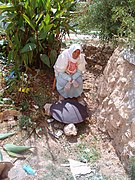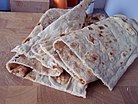Markook (bread)
 | |
| Alternative names | Shrak |
|---|---|
| Type | Flatbread |
| Place of origin | Middle East |
| Region or state | Iraq, Israel, Jordan, Lebanon, Palestine, Saudi Arabia and Syria |
Markook, also known as Shrak (Arabic: مرقوق، شراك) is a type of unleavened flatbread common in the countries of the Levant. It is baked on a domed or convex metal griddle, known as saj. It is usually large, about 2 feet in diameter, and thin, almost translucent. Similar to the procedures for making some other flatbreads, the dough of markook is flattened and kept very thin before cooking, resulting in a very slender depth. It is usually folded and put in bags before being sold. It is commonly compared to pita bread, which is known in Mediterranean cuisine.
Yufka (Sac Ekmeği)
Yufka is a type of Turkish bread. It is a thin, round, and unleavened flat bread similar to lavash, about 18 inches (40–50 cm) in diameter usually made from wheat flour, water and table salt. After kneading, the dough is allowed to rest for 30 min. Dough pieces (ca. 5-6 oz/150-200 g) are rounded and rolled into a circular sheet. The sheets of yufka dough are baked on a heated iron plate called a sac in Turkish . Baking time is approximately 2–3 minutes. During baking, the bread is turned over once to brown the other side. After baking, yufka bread has a low moisture content, and depending on how low the moisture is, a long shelf life. Before consumption, dry yufka bread is sprayed with warm water. The moistened bread is covered with a cotton cloth and is rested for 10 to 12 minutes before serving.
Gallery
-
Markouk prepared by Syrian Jews in Jerusalem.
-
Markouk being prepared and cooked on a Saj.
See also
References
- ""A Fork on the Road" - Miami Herald online". Retrieved February 21, 2008.[dead link]
- ""Saj Femmes" - Blog: Land and People". Retrieved February 21, 2008.




